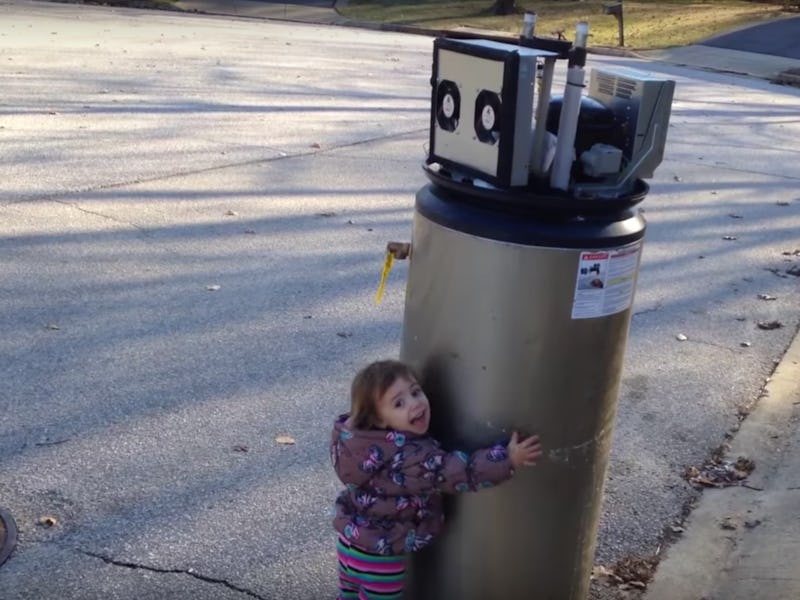You might be more likely to survive the singularity if you tell every robot you meet that you love it. If that’s true, the little girl named Rayna who met a broken water heater might be the only one of us to survive when A.I. takes over — as long as her adorable affection for machine-kind isn’t stamped out by pop culture first.
“I think that fear of robots is actually a learned behavior, probably from actually watching movies like Terminator,” Ross Knepper, a computer science professor at Cornell University, tells Inverse.
We expect the robots we interact with in real life to act like humans, but they don’t, says Knepper. This provides the basis for a very logical mistrust of robots. Knepper’s research focuses on how we can reprogram robots to be more human so people will trust them. But Rayna probably hasn’t encountered robots in the same way that adults have, he says, so she can greet her robot friend with innocent bliss.
“I think there are two things going on here,” says Knepper. “People like cute anthropomorphized things. And if you think about what a little girl of this age would be basing a mental model on, it would probably be cartoons.”
The water heater is perfect because it looks like a nice, friendly cartoon robot with a huggable body, square head, and large eyes. Ideally, it would also have arms, says Knepper. And robots in cartoons are friendly and talkative, which is probably why Rayna met the robot as warmly as she did. “If I were to build a robot to interact with children I might use something like a water heater as a model,” he says.
“There are actually legitimate reasons where people might mistrust real robots,” says Knepper. When people interact with each other we read things like tone of voice, body language, and social norms to build trust. So if someone bumps into you in a hallway and they apologize, you’re likely to trust that it won’t happen again, says Knepper. Right now we interact with robots as if they are people, but robots don’t do things like apologize, so we can’t trust them. “When a robot behaves in a way that’s different from how a person would, it surprises us,” Knepper says.
In the viral video, Rayna walks up to a broken water heater and says “Hi, Robot,” several times before hugging the water heater and saying “I love you, Robot.” The counterfeit robot plays its role stoically and does not respond. Rayna then gets distracted and moves on.
This isn’t because Rayna thinks that she didn’t just meet a robot, says Knepper. “I think she decided, it’s not going to respond to me.” While that may be a little sad, the water heater-bot still fit into her worldview of friendly, cute machines. Unlike the rest of us who have seen terrifying spider robots, or uncanny valley robotic babies, Rayna’s robot experience probably confirmed to her that robots aren’t going to do anything creepy or surprising, so she will carry that bliss a little longer.
